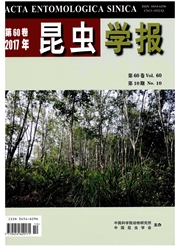

 中文摘要:
中文摘要:
刺吸式昆虫在刺吸作物韧皮部取食后会影响作物的正常生长发育,随着作物抗性及昆虫种类的不同,作物反过来也会对昆虫造成或正或反的影响,然而一种刺吸式昆虫取食后对后来者有什么样的影响目前尚不确定。本研究通过严谨的实验方法,即选定3个不同国家的小麦抗性品种98.10.30、Amigo和Batis,在所有条件严格统一的人工智能控制温室内,通过各处理在同一植株上先后不同的接蚜方式,分别测定了麦二叉蚜Schizaphis graminum(Rondani)和麦长管蚜Sitobion avenae Fab.在前期被蚜虫危害的抗虫品种98-10-30、Amigo和Batis上的发育历期、体重差及相对日均体重增长率(mean relative growth rate MRGR)等生物学参数。结果表明:品种不同,蚜虫在不同处理条件下取食作物时受到的影响也不同,即在品种98-10-30上,通过与前期不接虫的对照及前期接不同麦蚜的相关处理比较,麦长管蚜对后期取食的麦二叉蚜(MRGR=0.0974±0.0071)具有抑制作用,而麦二叉蚜对后期取食的麦长管蚜(MRGR=0.1614±0.0048)却有促进作用;在品种Amigo上,前期麦蚜的危害对麦长管蚜的取食具有促进作用,而在品种Batis上前期危害对麦二叉蚜的取食具有促进作用。同时明确了3个品种对两种蚜虫的抗性状况,即在前期无蚜虫危害时,品种98-10-30和Batis对两种麦蚜的抗性相当;在前期有麦蚜危害时,品种98-10-30对麦二叉蚜的抗性较好,而品种Batis对麦长管蚜的抗性较好;品种Amigo无论在任何处理下均对麦二叉蚜的抗性较好。
 英文摘要:
英文摘要:
Accumulated evidence shows that penetration insect attack may induce changes in host plant quality, and this will affect the normal growth and development of crops. With the change of crops resistance and insect variety, in turn, crops will cause positive or negative impact on insects. However, few studies have investigated the consequences of induced plant response due to previous insect attack on phloem-feeding insects. Herein we address whether the feeding behaviour and growth of a phloem-feeding insect are affected by host plant changes with scientific research methods using three varieties resistant wheat 98-10-30, Amigo and Batis, which are from three different countries. We measured respectively the development duration(DD), weight difference (dW) and mean relative gowth rate (MRGR) of Sitobion avenae Fab. and Schizaphis graminum (Rondani). The results showed that the aphids were either restrained or promoted when they fed on different treatment crops, compared with the control not fed by aphids and the corresponding treatment previously fed by different aphid species. S. avenae restrained the growth of S. graminum ( MRGR = 0.0974 ±0.0071 ) on 98-10-30, but S. graminum promoted the growth of S. avenae ( MRGR = 0.1614 ± 0.0048) on 98-10-30. Penetrations of aphids promoted the growth of S. avenae on Amigo, while promoted growth of S. graminum on Batis. In addition this study suggested that the wheat variety 98-10-30 and Batis had the same resistance when no aphids fed on them. However, the variety 98-10-30 had better resistance for S. graminum, and the variety Batis had better resistance for S. avenae when they were fed by aphids. The variety Amigo had better resistance for S. graminum under all situations.
 同期刊论文项目
同期刊论文项目
 同项目期刊论文
同项目期刊论文
 期刊信息
期刊信息
